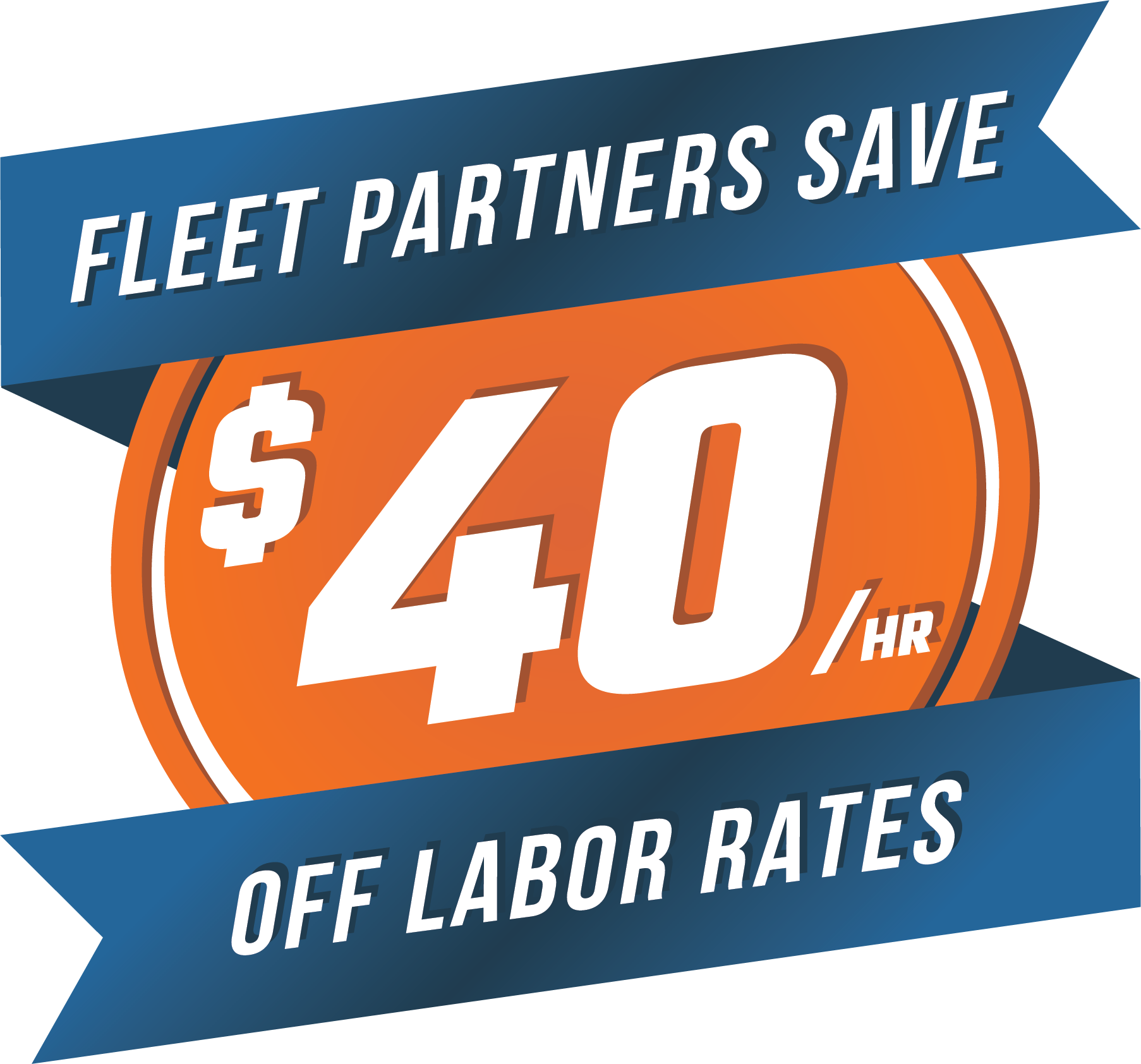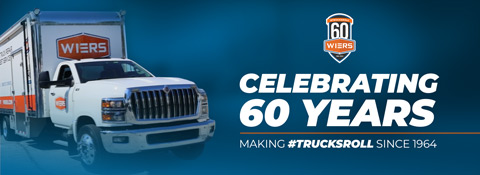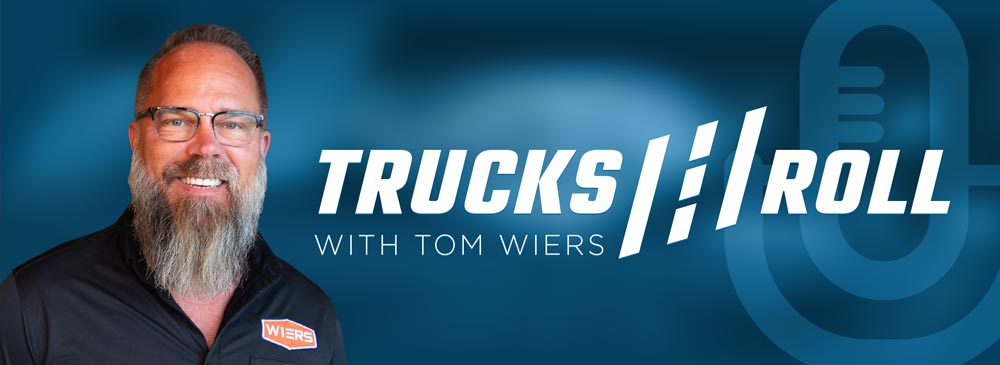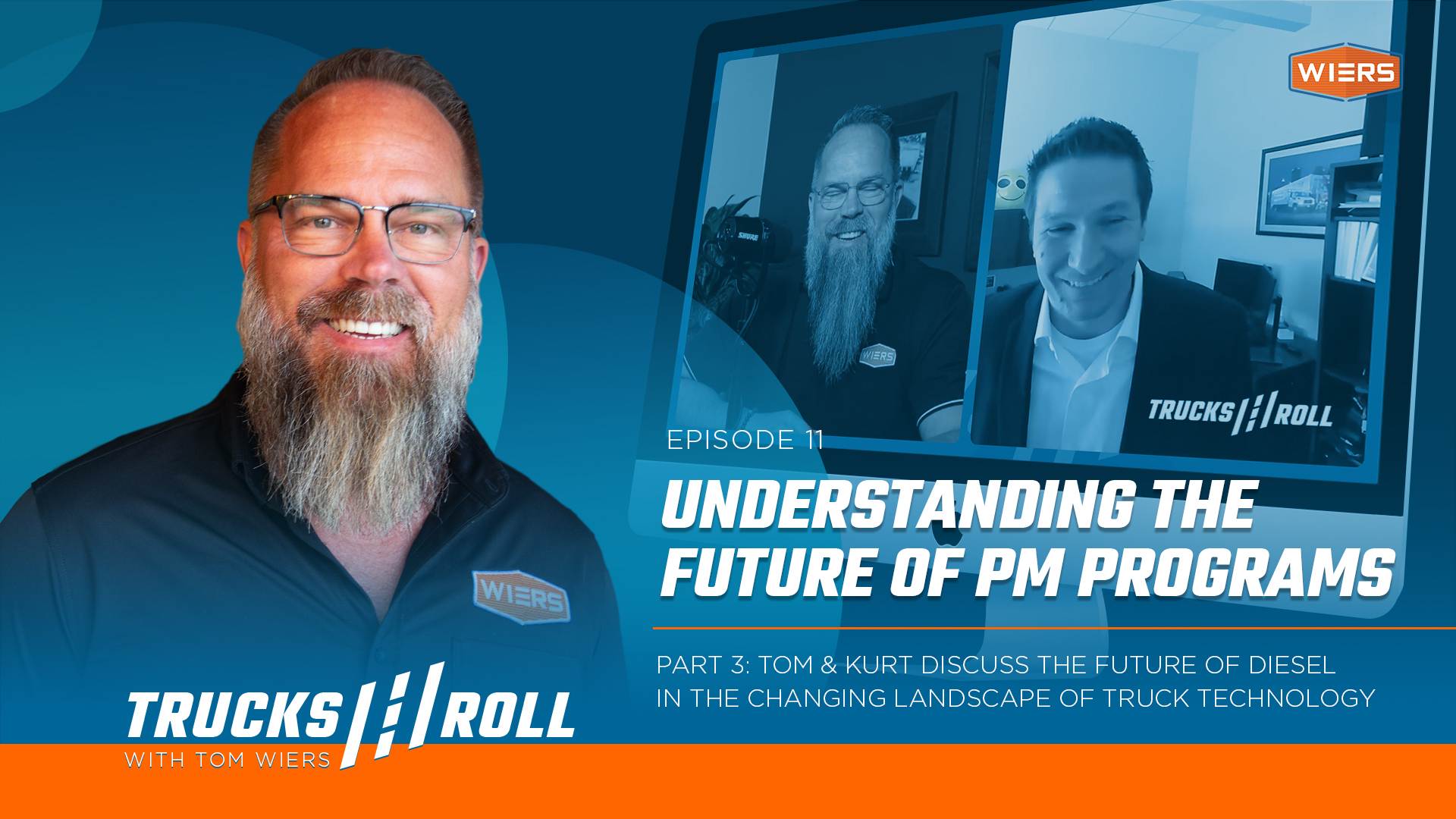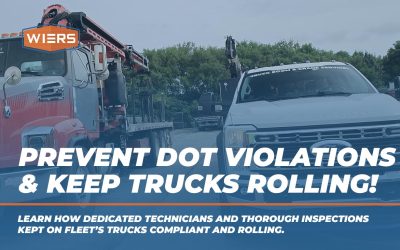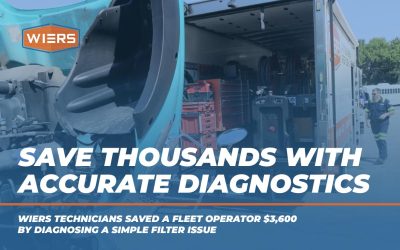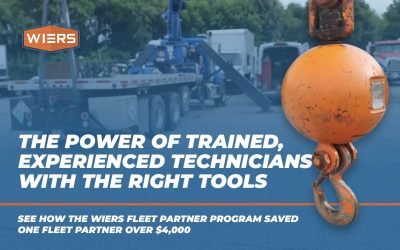
The Future of Preventative Maintenance – Trucks Roll, Ep. 11
Part 3: The Future of Diesel with Electric and Alternative Fuel Vehicles
In part 3 of our conversation with Kurt Dunn from Pitt Ohio, Tom and Kurt discuss the future of the diesel industry in the changing landscape of electric-powered and zero-emission vehicles.
In this episode you’ll learn:
- How alternative-power and zero-emission vehicles are starting to show up in shops
- The importance of ongoing training for technicians
- What is the best way to learn about these types of vehicles.
At Wiers, we’re committed to learning and staying up-to-date with the ever-changing technology of the trucking industry. Find out what we’re doing to help you keep your trucks on the road with a Fleet Partnership Plan.
Here is the transcript for Trucks Roll Ep. 11:
Kurt: My feeling about preventative maintenance… I talked about it earlier, but that is the tool to keep the trucks healthy. Preventative maintenance keeps the trucks healthy. I mean, if you want a, if you want a good, healthy truck preventative mean, this is the way to do it.
Tom: Hi, everyone. This is Tom Wiers with the Trucks Roll podcast. We’re bringing you part three today with Kurt Dunn from Pitt, Ohio. Today, we’re going be talking to you about the future of track technology and technician training. So, Kurt, one of the things I want to talk to you about is, you know, as you look to the future, I’ve been telling my team that we’re going to see more change in the next ten years than we have in the last 30. So I wanted to get your perspective on that. You know, and what you see is the future and how is that going to change the maintenance business and just maybe even the transportation side of it in general?
Kurt: Absolutely. I agree. I think we have a lot of changes coming in the next ten years. Some of the changes that we’ve seen and some of the challenges we’ve already faced talking about PMs is our CNG trucks here in Pittsburgh, we have we have 23 natural gas trucks based here in Pittsburgh, Class eight, and they come with their own PM challenges that we’ve had to kind of work through and to learn about. So I really feel like that’s just kind of the tip of the iceberg when we talk about some of this zero emission alternative fuel technology, because they still function like a diesel truck, they still function like a diesel engine.
Kurt: As we start talking about BEVs and electric power and hydrogen fuel cells and some of the stuff that’s out there, this is stuff we’ve never seen. I mean, we don’t I don’t know how to maintain some of this stuff. I’m not sure if there’s many people in the industry that do.
Tom: Right.
Kurt: And really that’s the time point when you’re going have to work with your with your OEM or your dealership.
Tom: Yeah, it’s a little scary. I remember to think about because I was at the International dealer meeting and this was a topic for the dealers. And one of them who runs a large organization was saying, you know, we’re thinking about our future dealership construction and how many service bays we’re going to need. Because with, you know, electric vehicles, there are 60% fewer components. I’ve heard that number thrown around and we probably don’t need as much service capacity service bays for electric, you know, vehicles going forward.
Tom: So it’s to your point, the maintenance, it’s all in known. And for a guy my age, the unknown in the future is a little scary. But so when do you think this is coming? Do you have any idea when when the world is going to change on us and we’re not going to be having any diesel powered trucks anymore?
Kurt: Well, I think they’re going to be around for a while. I mean, I do I see BEVs, ZEVs getting a lot of traction and really, you know, starting that you’re going to start seeing them move into your fleets and you’re going to start seeing a lot of buzz around them. And I definitely think they’re real. You know, we’ve looked into some of the technology ourselves and it’s, you know, it’s, you know, as a sustainable company, it means a lot. But there is some hurdles. There’s a lot of hurdle, a lot of challenges. I mean, this is a truck that doesn’t operate like a diesel truck. So the maintenance right now is a big question mark. I mean, I think even for a lot of the the manufacturers like this, they don’t have the data we spoke about earlier.
Kurt: They don’t have that data like, okay, this is we’ve been producing a million of these engines. We know exactly how long this engine can last on an average. We don’t know. I mean, I’m sure they have the information, but as far as, you know, test trucks and trucks on the on the road,
Tom: Right.
Kurt: we’re just diving into it. I mean, it’s an industry, but I think it’s going to be I think it’s here. I think we’re going to see it and we’re going to see a slow increase over the next ten, 15 years. I mean, I just don’t know. I mean, it’s going to depend on how quick the technology kind of reacts to the needs of the fleets and the customer and the consumer.
Tom: Yeah, it’s it’s it’s terribly interesting. It’s going to be an interesting ride for the next several years. Somebody explained it, electric vehicles as ketchup coming out of a bottle that we’re waiting and waiting and waiting and waiting. And then one day it’s just going to plop out and they’re going to be out on the street. But I mean, there’s a whole infrastructure needed for all of this new equipment as well. I mean, you know, electrification, electrification, you got to be able to have those, you know, facilities with electric power and, you know, the big and big investment for all that has to occur as well.
Kurt: Absolutely.
Kurt: But yeah. And then, you know, I’ll talk about my position a little bit. I do take a lot of pride in it and what we’ve been able to do because we’ve created a program here that we’re able to support the technicians.
Tom: Mh hmm.
Kurt: So we’re, you know, our program. But and it’s kind of one of those things where we talk about in our tech call because every once in a while something will come up. And I mean, we work with all of our OEM support. I’m always talking to our OEM support. I think it’s extremely important to be partners with your OEM support. I mean, they they have that intel that you need.
Kurt: And and I always joke with the guys who are our shop mechanics and you know, I learn at the pace of 150 mechanics. I learned at the pace of 23 shops because it’s everybody seeing stuff on that, on that link in the middle, always communicating. So
Tom: Right.
Kurt: it’s that cool little program that we’ve created, that information coming. For one shop will come into this central hub of our tech advisors, and then it’ll shoot out to all the shops. So we can we can process information kind of like a like a human computer. We can process this information and kick it back out to the rest of our technicians as we see something new. And, you know, our ability to pivot it with that, we can pivot with this technology. We see stuff going.
Tom: Yeah. And you said something at TMC, I think you don’t you do a lot of training on the job versus I mean, did you not touch base on something like that where a lot of training is actually while there on the shop floor?
Kurt: Yep. Yep, we do. We do a lot of training. We have a supervisor of training development who schedules in a lot of trainings into the shop and does a great job keeping kind of OEM training is stuff going, but as tech advisors, our technical team, every call is a training opportunity. So if I have a technician, call me I had couple of this morning. If I have a technician, call me and say I’m working on this. We’ll walk through the whole process and we’ll kind of connect the dots for them, will help them understand, okay, this, this, this and this.
Kurt: Sometimes we don’t know what we’re learning is as the technicians learn. But if it’s something something that we’re doing and, you know, we’re walking through as a technician, we find out kind of where he kind of missed his step. And then we just put we put him back on that step and we kind of walk through the rest of the process. And it’s it’s that live training as we’re troubleshooting. The best the best experience for me, at least as a mechanic, was always right there. When my hands are dirty,
Tom: Yep.
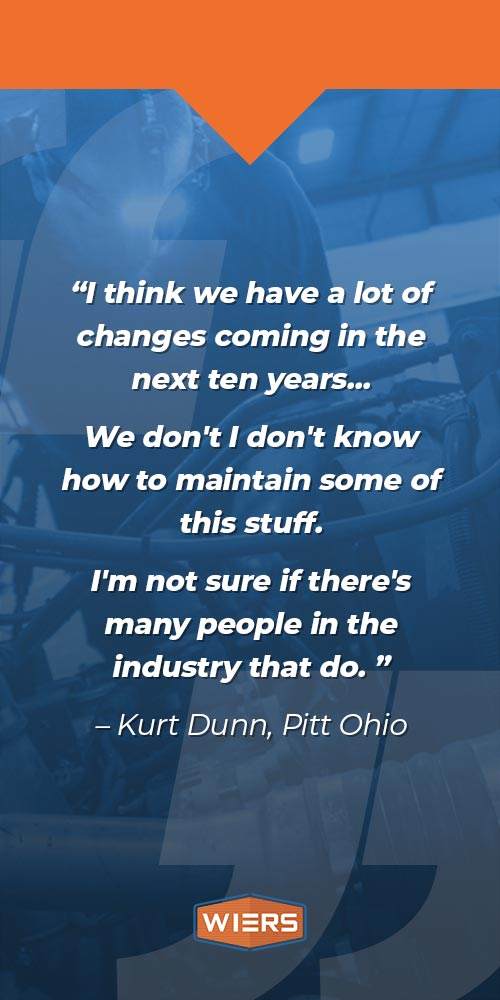
Kurt: Tell me tell me what I’m doing that I. That I’ve missed it.
Tom: Right
Kurt: Man, I’ve missed a bunch of them. I wish I didn’t, but I’ve missed a bunch of diags before.
Kurt: And that’s that’s when you learn, you’re frustrated, you’re mad. And then if you can have that somebody and that’s what we’ve done. We’ve built that somebody in your ear that’s home. Now let’s walk through this and let’s find out where we went wrong. And then you get that. And then it’s like, okay. And it’s one of those things. They’ll never do it again. It’s, it’s, they’ve got that one in there.
Tom: That’s great. Now do you have any sort of internal documentation that goes along with with that as well as you guys are learning through this?
Kurt: We don’t. I wish we did and we’ve tried it, but it was always one of those things, depending on how how busy it is, there’s only two of us, two type of letters. And depending on how busy the date is. Right, it can it can feel pretty much like a call center.
Tom: Sure. Yep. Absolutely.
Kurt: So every time we get something started, it kind of goes though. Usually it’s just a notebook paper and we’ve got we do make it a big point though. Every call we get, we follow up with the next day.
Tom: Yeah.
Kurt: The next morning, we just make sure we circle back around and make sure that, you know what? We did work and then the truck back on the road.
Tom: Yeah, that’s great. Well, you guys are doing some really cool stuff, and that’s why, you know, one of the reason I wanted to have you on the Trucks Roll podcast. Is there anything else I should be should be asking you now before we finish up this episode?
Kurt: Man, I don’t know. I mean, I’m looking at my notes. I think we hit it pretty good. I mean, it’s it’s good to be on that podcast, talk about some stuff, kind of put some stuff out there. And we had a great time down on TMC when we were talking. But I kind of put in words in the conversation there. I mean, I really feel like the one thing I guess I should top it off with, you know, on my feeling about preventing the media. So I talked about it earlier, but that is the tool to keep sharks healthy. Yeah. Know, maintenance keeps the trucks healthy. I mean, if you want to if you want a good healthy truck preventatively, this is the way to do it.
Tom: I you know, I tell you, that is so true. And the professionals and people that are around it on a daily basis know how important it is. And, you know, I just you just can’t say it enough for those that, as I said earlier in the podcast that aren’t dealing with trucks on a daily basis, you know, they’re busy doing a lot of other important things in our business. But man, if we can just get them to buy into the preventive maintenance schedule, you know, I always talk about if you if you’re on a quarterly PM cycle and you miss, you’re late every 30 days. So instead of getting it done on July 1st, you wait till August 1st and then, you know, at the end of five years, you’re going to miss an entire year with a PM, believe it or not, just by being late 30 days every time you get a PM.
Tom: So it’s I think sometimes customers get tired of us calling them up. Tell them to get your trucks in for a PM. They maybe think that’s about a revenue revenue for our company, but it’s really about, hey, that’s the most effective way to keep your trucks on the road and reduce your costs and you know if your cost is low and your trucks on the road. You’re probably going be a pretty happy customer. And that’s that’s what we want. So it’s great to hear that again from somebody with, what, 20, would you say 2200 power units? You know what you’re talking about. You got a lot of data, you got a lot of experience and you got a lot of satisfied customers out there.
Tom: They’re getting their shipments on time because of the work that you’re doing. So we appreciate you taking the few minutes and spending with us. Tell him a little bit more about PITT OHIO, sounds like an amazing company and just thankful to have you represent the industry and and appreciate you being on with us for today’s podcast.
Kurt: Tom, appreciate you having me.
Tom: Hey, thanks for tuning in to Trucks Roll podcast. And we appreciate Kurt Dunn spending time. Time with us and teaching us about things are going on in the industry and sharing his experiences with us. Please be on the look out for future episodes. We’re going to bring on more industry experts like Kurt to share their experiences and help us run our businesses more efficiently. Again, in the meantime, please go to Wiers.Com. We’ve got a great product offering for you and we’d love to help you keep your trucks on the road.
Links:
- Share your thoughts and connect with us on Facebook
- Check out more videos on Youtube
- Listen to Previous Episode
